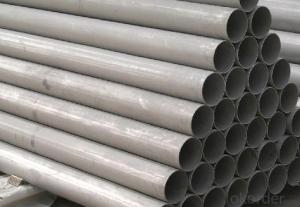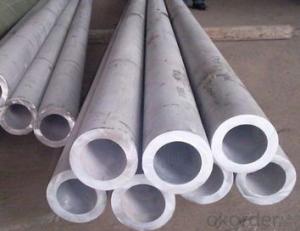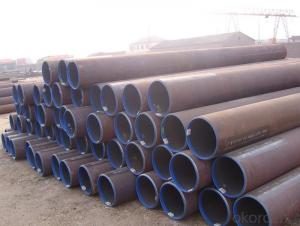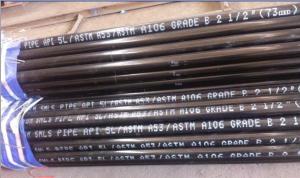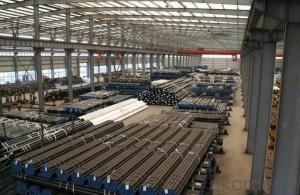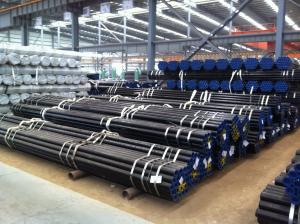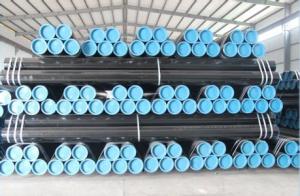Seamless Carbon Steel Pipe API 5L For Oil Usage
- Loading Port:
- Tianjin
- Payment Terms:
- TT OR LC
- Min Order Qty:
- 25 m.t.
- Supply Capability:
- 10000 m.t./month
OKorder Service Pledge
OKorder Financial Service
You Might Also Like
Product Description:
1、Structure of Seamless Carbon Steel Pipe API 5L For Oil Usage Description:
Seamless pipe is formed by drawing a solid billet over a piercing rod to create the hollow shell. As the manufacturing process does not include any welding, seamless pipes are perceived to be stronger and more reliable. Historically seamless pipe was regarded as withstanding pressure better than other types, and was often more easily available than welded pipe.
2、Main Features of Seamless Carbon Steel Pipe API 5L For Oil Usage:
• High manufacturing accuracy
• High strength
• Small inertia resistance
• Strong heat dissipation ability
• Good visual effect
• Reasonable price
3、Seamless Carbon Steel Pipe API 5L For Oil Usage Images:
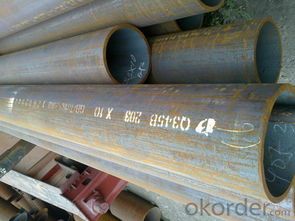
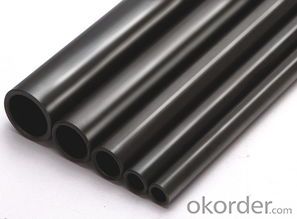
Packaging & Delivery
Packaging Details: | seaworthy package,bundles wrapped with strong steel strip |
Delivery Detail: | 15-30days after received 30%TT |
4、Seamless Carbon Steel Pipe API 5L For Oil Usage Specification:
Standard | GB, DIN, ASTM |
Grade | 10#-45#, 16Mn |
Thickness | 8 - 33 mm |
Section Shape | Round |
Outer Diameter | 133 - 219 mm |
Place of Origin | Shandong, China (Mainland) |
Secondary Or Not | Non-secondary |
Application | Hydraulic Pipe |
Technique | Cold Drawn |
Certification | API |
Surface Treatment | factory state or painted black |
Special Pipe | API Pipe |
Alloy Or Not | Non-alloy |
Length | 5-12M |
Outer Diameter | 21.3-610mm |
Grade | 20#, 45#, Q345, API J55, API K55, API L80, API N80, API P110, A53B |
Standard | ASME, ASTM |
1.Material:20#(ASTM A 106/A53 GRB.API5LGRB,GB),45#,16Mn,10#.
2.Specification range:OD:21.3-610mm,WT:6-70mm,length:6-12m or according to the requirement of clients.
3.Excutive standards:GB,ASME API5L.ASTM A 106/A53,Despite of the above standards,we can also supply seamless steel pipe with standard of DIN,JIS,and so on,and also develop new products according to the requirements of our clients!
4.Surface:black lacquered,varnish coating or galvanized.
5.Ends:Beveled or square cut,plastic capped,painted.
6.Packing:bundles wrapped with strong steel strip,seaworthy packing.
5、FAQ of Seamless Carbon Steel Pipe API 5L For Oil Usage:
①How is the quality of your products?
Our products are manufactured strictly according to national and internaional standard, and we take a test
on every pipe before delivered out. If you want see our quality certifications and all kinds of testing report, please just ask us for it.
Guaranteed: If products’ quality don’t accord to discription as we give or the promise before you place order, we promise 100% refund.
②How about price?
Yes, we are factory and be able to give you lowest price below market one, and we have a policy that “ for saving time and absolutely honest business attitude, we quote as lowest as possible for any customer, and discount can be given according to quantity”,if you like bargain and factory price is not low enough as you think, just don’t waste your time.Please trust the quotation we would give you, it is professional one.
③Why should you chose us?
Chose happens because of quality, then price, We can give you both.Additionally, we can also offer professional products inquiry, products knowledge train(for agents), smooth goods delivery, exellent customer solution proposals.Our service formula: good quality+good price+good service=customer’s trust
SGS test is available, customer inspection before shipping is welcome, third party inspection is no problem.
Any question, pls feel free to contact us !
- Q: How are steel pipes used in airport infrastructure?
- Steel pipes are used in airport infrastructure for a variety of applications such as constructing hangars, fuel distribution systems, water supply networks, and underground utility lines. They provide structural support, durability, and resistance to extreme weather conditions, making them essential for the smooth functioning and long-term reliability of airport facilities.
- Q: What is the difference between internal and external coating for steel pipes?
- Internal coating for steel pipes refers to the application of a protective layer on the inner surface of the pipe. This coating is primarily used to prevent corrosion and to enhance the pipe's resistance to various chemicals present in the fluid being transported. The internal coating is typically applied using techniques such as spraying, brushing, or dipping, and it can be made of various materials such as epoxy, polyurethane, or cement mortar. On the other hand, external coating for steel pipes involves the application of a protective layer on the outer surface of the pipe. The purpose of this coating is to provide protection against environmental factors such as corrosion, abrasion, and impact. External coatings are usually applied using methods like wrapping or coating with materials like polyethylene, fusion-bonded epoxy, or asphalt enamel. In summary, the main difference between internal and external coating for steel pipes lies in their location and purpose. Internal coatings protect the inner surface of the pipe against corrosion and chemical attacks, while external coatings safeguard the outer surface from environmental damage. Both types of coatings are crucial for ensuring the longevity and reliability of steel pipes in various applications.
- Q: Can steel pipes be used for structural supports?
- Yes, steel pipes can be used for structural supports. Steel pipes are strong, durable, and have high load-bearing capacity, making them suitable for providing structural support in various applications such as buildings, bridges, and infrastructure projects.
- Q: What is the difference between steel pipes and cast iron pipes?
- The main difference between steel pipes and cast iron pipes lies in their composition and durability. Steel pipes are made from an alloy of iron and carbon, which results in a strong and durable material. They are highly resistant to corrosion and can withstand high pressure and temperature. On the other hand, cast iron pipes are made from molten iron and have a higher carbon content. While they are also durable and have good pressure-bearing capabilities, they are more prone to rust and corrosion over time. Additionally, cast iron pipes are typically heavier and more brittle compared to steel pipes.
- Q: Can steel pipes be used for underground compressed air pipelines?
- Yes, steel pipes can be used for underground compressed air pipelines. Steel pipes are durable, corrosion-resistant, and have high strength, making them suitable for withstanding the pressure and environmental conditions of underground installations. Additionally, steel pipes can be easily welded and are readily available in various sizes, allowing for flexibility in designing the compressed air pipeline system.
- Q: How are steel pipes protected during transportation?
- Steel pipes are typically protected during transportation through a variety of means such as wrapping them with protective coatings, using plastic or metal caps to cover the ends, and securing them with straps or bands to prevent any movement or damage. Additionally, they may be placed in crates or on pallets and secured with stretch film or shrink wrap for added protection.
- Q: How do steel pipes differ from other types of pipes?
- Steel pipes differ from other types of pipes in a few key ways. Firstly, steel pipes are known for their strength and durability. They have a high resistance to heat, pressure, and corrosion, making them suitable for a wide range of applications. This strength also allows steel pipes to withstand heavy loads and provide a long service life. Another distinguishing feature of steel pipes is their versatility. Steel pipes can be manufactured in various shapes and sizes to meet specific project requirements. This adaptability makes them a popular choice for a wide range of industries, including construction, oil and gas, water treatment, and manufacturing. Steel pipes also offer excellent thermal conductivity, meaning they can efficiently transfer heat from one area to another. This makes them suitable for applications such as heating and cooling systems, as well as for transporting hot fluids or gases. Furthermore, steel pipes are known for their resistance to fire. They have a high melting point and do not easily catch fire or contribute to the spread of flames. This property is crucial in applications where fire safety is a concern, such as in buildings or industrial facilities. Lastly, compared to other types of pipes, steel pipes have a higher initial cost. However, their long-term benefits, such as their durability and low maintenance requirements, often outweigh the initial investment. Steel pipes are also highly recyclable, making them an environmentally friendly choice. In summary, steel pipes stand out from other types of pipes due to their strength, durability, versatility, excellent thermal conductivity, fire resistance, and recyclability. These qualities make steel pipes a preferred option for a wide range of applications in various industries.
- Q: How are steel pipes used in the chemical industry?
- Steel pipes are extensively used in the chemical industry for various applications, including transportation of chemicals, gases, and liquids. They are highly durable, corrosion-resistant, and can withstand high pressure and temperature conditions. Steel pipes are used in chemical plants for the transfer of raw materials, intermediate products, and final products within the production process. They are also employed for the distribution of utilities such as water, steam, and compressed air. Additionally, steel pipes are utilized for the construction of storage tanks, reactors, and other equipment in the chemical industry due to their strength and reliability.
- Q: What is the role of steel pipes in the transportation of chemicals?
- Steel pipes play a crucial role in the transportation of chemicals due to their high strength and durability. They are used to safely transport a wide range of chemicals, including corrosive and hazardous substances, without the risk of leakage or contamination. The corrosion-resistant properties of steel pipes ensure the integrity of the chemicals being transported, preventing any potential damage to the environment or human health. Additionally, steel pipes can withstand high pressure and extreme temperatures, making them ideal for the efficient and reliable transportation of chemicals over long distances.
- Q: Can steel pipes be used for agricultural irrigation?
- Yes, steel pipes can be used for agricultural irrigation. They are a durable and long-lasting option that can withstand high pressures and extreme weather conditions. Steel pipes also provide excellent protection against corrosion and damage, making them suitable for various irrigation systems in agriculture.
Send your message to us
Seamless Carbon Steel Pipe API 5L For Oil Usage
- Loading Port:
- Tianjin
- Payment Terms:
- TT OR LC
- Min Order Qty:
- 25 m.t.
- Supply Capability:
- 10000 m.t./month
OKorder Service Pledge
OKorder Financial Service
Similar products
Hot products
Hot Searches
Related keywords
